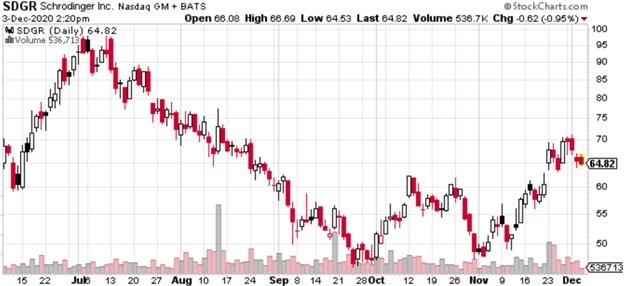A software company backed by Bill Gates and hedge fund legend David Shaw is about to disrupt the pharmaceutical industry. But many investors seem to be missing the opportunity, suggests Jon Markman, tech sector specialist and editor of Pivotal Point.
Schrodinger, Inc. (SDGR) uses breakthrough artificial intelligence to help companies discover new drugs faster and cheaper. The shares debuted Feb. 5 and promptly soared. Then the coronavirus hit.
Since 1990, the New York software company has been tackling the most difficult and costly part of drug discovery using artificial intelligence, machine learning and physics-based predictive analytics. In the process, the firm's platform became the industry standard for molecular simulation.
The business takes its name from Erwin Schrodinger, a Nobel Prize-winner born in 1887. The Austrian physicist is best known for Schrodinger's Cat, a thought experiment based on quantum psychics and superposition.
The premise of the firm's platform is to use software to predict status. It is in use at 1,250 academic institutions worldwide and the top 20 pharmaceutical companies, as measured by sales. The customer retention rate across its 1,150 subscribers is 96%.

The pharmaceutical industry spent $179 billion on research and development during 2018, according to Statista. The market is expected to swell to $202 billion by 2022.
So far, Schrodinger has a tiny sliver of that business. The company generated sales of only $85.5 million in 2019, an 28% increase year-over-year. And due to extensive spending in R&D and new hiring, the company had losses of $24.5 million during that time frame.
Despite this, the outlook is beyond bright. The company is at the epicenter of a larger digital transformation. Its core biotech and pharma clients are only beginning to embrace AI and predictive analytics models to accelerate drug discovery and reduce costs. Schrodinger is the logical partner.
Together, Gates and Shaw own 50% of the voting stock of the company. They both got rich by investing in really big ideas from tiny companies. The stock trades at 43.7 times sales and the market cap is $4.4 billion. Savvy investors would be wise to buy shares into weakness.










